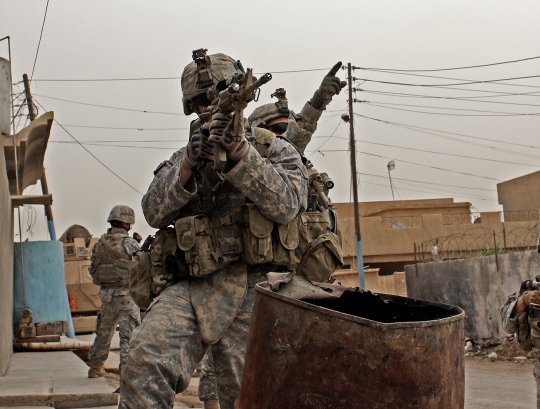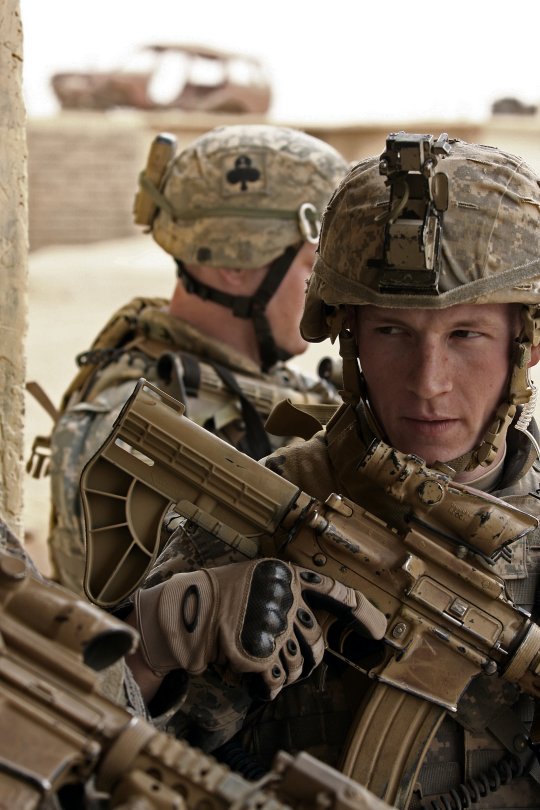
Tiger Force Soldiers scan rooftops in Bayji, Iraq during a recent mission. From Vietnam to Iraq, Tiger Force Soldiers have been at the tip of the spear.Tiger Force, which is part of the 1st Battalion, 327th Infantry Regiment, is the most highly decorated platoon sized element in the U.S. Army. Tiger Forces Soldiers, past and present, maintain close ties. (U.S. Army photo/Spc. Rick L. Rzepka)

Tiger Force Soldiers investigate a building suspected of being used to store black market fuel in Bayji, Iraq
Uncommon Bond: Screaming Eagle’s Stay Connected to Vietnam-era Brethren While Serving in Iraq
By Spc. Rick Rzepka
1st Brigade Combat Team, 101st Airborne Division
BAYJI, Iraq – This ain’t your father’s Army. Some say it’s a kinder, gentler Army, wary of political correctness and public perceptions. Some say that this has caused soldiers to lose touch with their roots, to disconnect themselves from the past. But for one Infantry platoon, at the heart of the fight in Iraq, some things never change and they are neither kind nor gentle.
Somewhere, in the dusty expanse of the Salah ad Din province in Iraq, the Tigers are lurking. They patiently wait for their prey in the city and in the desert. They are keenly aware, not only of their immediate surroundings, but of their heritage as well. They know they have some big boots to fill.
Tiger Force, 1st Battalion, 327th Infantry Regiment, 101st Airborne Division (Air Assault), is the most highly decorated platoon sized element in the U.S. Army.
Over the past 48 years, Tiger Force Soldiers have earned two Medals of Honor, the Distinguished Service Cross, numerous Silver Stars for valor and countless other commendations. Names like Hackworth, Gertsch, and Gardner are synonymous with the Tiger legacy, which began in the sweltering jungles of Vietnam.
In 1965, as the Vietnam War picked up steam, Army brass recognized a need for more unconventional, guerilla style warfare. A young Lt. Colonel in the 101st Airborne Division named David Hackworth proposed that by utilizing small, highly trained units, Vietcong tactics could be effectively countered. The brass liked what they heard and the Tigers were born through highly experienced, hand selected volunteers from the 1st Brigade, 101st Airborne Division.
Their mission: “To out guerilla the guerillas,” according to Hackworth, or as MoH recipient Staff Sgt. John G. Gertsch said, “How to really be there, but not be there.”
“During the Vietnam years, Tiger Force went through many changes in the full spectrum,” said Hank “Doc” Ortega, who served as a Tiger Force medic in 1968. During their time in Vietnam, Tiger Force Soldiers ran the gauntlet of small unit operations, from scouts, ready reaction and long range reconnaissance. “We were basically the eyes and ears of the battalion commander,” he said.
“Here is a platoon deep-rooted in history and tradition,” said Lt. Col. Peter Wilhelm, “Above the Rest” Battalion Commander. “A platoon that I reserve for the best of the best,” he said.
Tigers today, still serve at the behest of the battalion commander in the surly terrain of the Salah ad Din province. To pigeon-hole the Tigers, would be to say that they simply serve as the battalion’s sniper and recon asset, but like their predecessors in Vietnam they have found themselves covering down on a wide array of missions and have been instrumental in taking high-value targets, weapons caches and improvised explosive devices off of the streets, as well as conducting various non-lethal operations.
“We do what is necessary in the area of operations to defeat IED’s, secure high –value targets and support the division’s effort,” said Sgt. Josh Smith, Tiger Force sniper section team leader. “Today’s battlefield requires so much more out of every element,” he said. “There’s no arguing that what we are doing today is the graduate level of warfare. You’ve got to think outside the box or wind up in a box.”
For Smith and other Tiger Force Soldiers, preserving the Tiger’s legacy is an important part of the job. “We do everything with the past in mind,” said Smith. “The bond that the current members have with the past members is unbelievable,” he said.
During a 101st Airborne reunion event dubbed “Week of the Eagles”, in the summer of 2000, Ortega and other Tiger Force veterans returned to Fort Campbell, KY, to give young Soldiers a glimpse into their past and have been dropping in on the Tigers ever since.
“We gave these young men back their history,” said Ortega. “We brought names like James Gardner and John Gertsch to life because we knew these men and served with them,” he said. “They are not just names on a wall to us, and the young guys deserve to be connected to that history.”
In garrison, it is not uncommon for an old Tiger to stop by the battalion to see how the platoon is coming along. During these visits, tales are swapped and the vets get a chance to check out the newest tools of the trade. “Back in the day they were using M-14 rifles with big old Starlight scopes and they were really impressed with the new gear,” said Smith. “They get a kick out of it and we get a kick out of doing it because it’s just old meets new.”
In today’s rapidly evolving force, Soldiers often overlook the history of their units and have little or no link with the warriors who came before them.
“I would say it’s very rare,” said Smith. “I’m in touch with at least a dozen Vietnam-era, Tiger Force vets, and a few in between,” he said. “We are very much a big extended family.”
Veterans of Tiger Force send care packages and essential items to their deployed brethren in Iraq and have acted as a support system through the hard times.
“December was a bad month for us,” said Smith. On Dec. 4, 2007, Tiger Force lost its Platoon Leader, Capt. Adam Snyder and two fellow Soldiers, Sgt. Eric Hernandez and Pvt. Dwayne White to an IED attack. The loss was devastating to Tiger Force Soldiers both young and old.
“When we lost men on Dec. 4th of 2007, it felt the same to us vets as when we lost those we served with…exactly the same,” said Ortega. “These young guys are our brothers.” Tiger Force veterans were in attendance at each fallen Soldier’s funeral services and were there to provide support to loved ones. “They got in touch with the families, made trips for support and basically did everything they could to make them as comfortable as they could be in their time mourning,” said Smith. “You’re not going to see that level of dedication, 40 years later, in many other places,” he said.
For Ortega, supporting the Tigers isn’t a random act of kindness, it’s fulfilling the oath of honor and country.
“For my own part, my wife and I spent almost two months at Ft. Sam Houston at the bedside of a Tiger who was wounded, assisting him and his family with his recovery,” said Ortega. “I would work in the aid-station if I could.”
“Doc” Ortega’s selfless-service to his country and to the Tigers is the model upon which the latest generation looks up to.
“All I can hope for is that the new Tigers are as receptive to the older guys as we are,” said Smith. “They go so far above and beyond. So many people get out of the Army and leave it all behind,” said Smith. “They are who we are.”
Ortega would like to see more of these uncommon bonds forged between warrior generations. “I think that more and more Vietnam-era veterans, especially of combat units, are making an effort to relocate their buddies and as a part of that effort, they are sometimes making contact with their younger counterparts at the reunions,” said Ortega
“We need to make this sort of contact and support far less unusual.”
For Smith and the rest of the Tigers in Iraq, bridging the generation gap has bred a sense of respect and admiration to the Tiger name. “We’re just proud to know them, you know? “The best thing for us is for them to feel like they’re still part of the team.”

A really good story. I have read several books about the 101st in Vietnam and they always realated the exploits of the 1st of the 327th and Tiger Platoon. Col. Hackworth was very proud of the unit he formed.
Very nice that the troopers of various generations, including serving troopers, can get together and share comraderie.”doc” Ortega is still being a medic to troopers decades later.
Outstanding story WT. Ditto Tom, they sure are a tight outfit.
Tom, thank you !! I love this story so much.
Jack, all of you, from the Nam war and this war, all are connected in such a very special way. I love it.